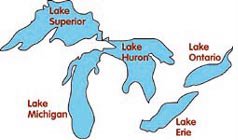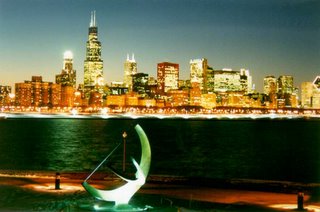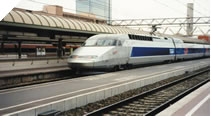Michigan My Michigan
Written by: William Otto Miessner & Douglas M. Malloch
Verse One (http://www.50states.com/songs/michigan.htm)
A song to thee, fair State of mine,
Verse One (http://www.50states.com/songs/michigan.htm)
A song to thee, fair State of mine,
Michigan, my Michigan;
But greater song than this is thine,
Michigan, my Michigan;
The whisper of the forest tree,
The thunder of the inland sea;
Unite in one grand symphony
Of Michigan, my Michigan.
For the past five years the State of Michigan has been in an economic funk. While the rest of the nation continues to rebound we Michiganders are constantly bombarded by bad news involving (name a few) our auto and manufacturing industries, education system, Great Lakes, mass transit and the fleeing of our educated young people to other states for better job opportunities.
For those of you that follow my blogs I am constantly challenging and questioning our education system (I will continue). In 2006, I plan to branch out and start asking questions as to why we have no mass transit system that will connect our cities into an “interdependent” highway of a system versus the independent highway system that we have had since the invention of the automobile.
I also want to challenge and question why our state does not do more promoting, developing, advertising, consumption, and protecting our “Great Lakes?”

Here are some recent facts:
- Federal officials (11/18/05) say they won't pay for the $20-billion plan President George W. Bush sought last year to improve the health of the Great Lakes by restoring coastal wetlands and keeping out sewage and invaders like zebra mussels. A bipartisan coalition of elected leaders says it was stunned when an Environmental Protection Agency report recommended that Bush focus on "improving the efficiency and effectiveness of existing programs" instead of launching expensive new efforts.
- 12/8/05) Great Lakes near ecological breakdown: Seventy-five scientists who study the world's largest collective body of fresh water released their report on countless problems.
- Shoreline pollution that fouls Great Lakes beaches is extending into the middle of some of the five Great Lakes, sudden drops in oxygen levels in the water threaten native species, and native fish have been crowded out by invasive species that have changed the character of the lakes, the scientists added (12/08/05).
- Why are we still concerned about "Mercury? Levels in fish? After all we have known about this problem for decades. Oh, I forgot the coal-fired power plants around the lakes still have not removed mercury from their emissions. I know let's give them another 5-10 years to do this, all the while politicians come and go and the monitoring effort is left up to the power plants themselves to police their own activities. yeah, that will work.
- Scientists fear Great Lakes poised for disaster (1/05/05). So far Great Lakes conservation projects, mostly under Federal auspices, have been done piecemeal - find a problem and fix it.
There it is folks (piecemeal and fix it), the number one problem I am always referring to when it comes to improvement opportunities. – SUB-OPTIMIZATION, as long as political groups and committees are involved (Fed, State and Public) their will be sub-optimization. The irony is they don’t even realize the damage they do by not having one common money purse, one aim, one plan and one mission for all. Sub-Optimization is found in all our major problems – Find a Problem and Fix It (Low Hanging Fruit).
Systems Optimization: It’s about interdependencies, we must realize that change cannot occur in one part without affecting the performance and outcome in all other parts of the primary system (ie., transit, water, education, etc.) the system as a whole, and ultimately all other systems by which the primary system operates.
- (1/08/06) - Ann Arbor-to-Detroit mass transit report cites commuters' support Metro group to proceed with study of a rail or bus system to meet demands for quick, reliable service. AGAIN WITH THE PIECEMEAL – OK to start here, but whole state (system) must be involved and connect all major arteries (Grand Rapids, Lansing, Auburn Hills, Ann Arbor, and Bay City in one short-term and long-term plan. Geez will anybody in Lansing take notice?
- (1/08/06) - Southeast Michigan Council of Governments plans to hold public hearings in Detroit, Dearborn and Ann Arbor in late spring to gather opinions on the five chosen options for a transit route between Ann Arbor and Detroit, with a stop at Metro Airport. The meetings are expected to be held in late March or early April.
- Compared to the costs of building and expanding highways, mass transit is an incredible bargain. For example, the Michigan Land Use Institute reports that establishing a rail line radiating out from Detroit to Pontiac, Ann Arbor and Mt. Clemens would cost $130 million, half the $260 million tab expected just for diverting traffic during the proposed $1.3 billion rebuilding of 11 miles of I-94. Wonder how much money went in to the fixing of I-94 from Metro Airport to Detroit for Super Bowl 2006?
- The issue is particularly sensitive in Michigan, where sprawl has drained Detroit of economic resources while at the same time creating more pollution and putting more distance between jobs and the unemployed. How long will this go on?
- Are not people spreading out (moving to outlining areas) in Michigan faster than the negative population growth (this is negative)?
Young People Leaving State – questions/facts
- Studies suggest young people ages 25-34 are leaving Michigan for "cooler" places like Chicago, Boston and New York-indeed, the state lost more than 200,000 members of this age group, or 13.5%, in the last decade.
- Has anyone Benchmarked Royal Oak? – Probably the state’s most vibrant city (some may say Ann Arbor but would they be if UofM was not there) that attracts crowds of people everyday of the week (no casinos). They have downtown lofts, art galleries, coffee shops, restaurants, outdoor dining, street entertainment, and unique shops, dance clubs, comedy clubs and martini bars all within walking distance.
- What about Governor Granholm’s initiative in 2003 “Michigan’s Cool Cities Initiative? (Hot Jobs, Cool Cities)” It was supposed to be about creating HOT job in COOL Cities in Michigan. Can someone provide an update? How much money have we spent thus far?

Should we be concentrating on keeping our own rather than attracting outsiders? qualityg says “Better start with our own first.”
So you can see there are so many more questions to ask in the coming months. It's also interesting that each one of the three issues above (Great Lakes, Mass Transit and Young People Leaving all are 'Interdependent" upon one another for survival, yet there are so many private and public initiates to improve each, and each continues to tear each other apart - Sub-Optimization. Can anyone say Mississippi!

5 comments:
Qualityg, the reason there is not a mass transit system in Michigan is because the auto companies are there. These auto companies need consumers to feel like they need a new car every 3 to 5 years so that they can keep churning out their product. The last thing they want is for you to have your car parked in your garage while you get to work using mass transit systems. Instead of putting 15 to 20 thousand miles a year on your car, you'll put 5 to 8 thousand instead. Your car will last 12 to 15 years at that rate. What will be the effect on Michigan's economy then?
j-man,
Yes, I agree with that thinking about 20 - 30 years ago. However, for the auto companies and the people of Detroit this should no longer be an issue about new cars every three to five years.
Michigan's economy is impacted by the "global sales/revenue" of the auto companies and not what happens in Metro Detroit or Michigan.
If you look close at the numbers and where Ford and GM are making money it is overseas with their trucks.
Think end-to-end, Michigan is a piece of the whole, if you concentrate solely on the piece the whole will fail.
Unfortunately, the rest of the United States auto consumers does not follow the new 3-5 year car rule. That is why so many Toyotas and Hondas sell well in the United States and Michigan for that matter.
If Michigan really wants to improve their economy they must learn how to compete globally now and in the next 20 years.
Diversity is the key and not just concentrating on auto companies and manufacturers that support the auto companies (still being done).
Michigan needs and must require "super" smart citizens that can not only take a portion of the global pie but innovate and create new products and services and take new portions for itself.
qg
QualityG,
What do you mean when you say "Super Smart Citizen?"
Regards,
Raj
Raj,
Super Smart Citizens are people who believe in life long learning. They continue to improve on their skills both in formal education and application (i.e, experience). They are not always the book smart folks, they are the ones who are flexible and change with the times.
SSCs will be able to compete and keep earning good wages in the global market, regardless of location. Companies will always need SSCs.
Folks who still believe post high school education and learning does not matter will suffer the most in the global economy. We see it now, companies are demanding wage decreases and new starting rates are the lowest in recent industry.
Gone are the days when one can graduate from high school and earn a decent wage in a factory. In global competition workers in China, Russia, etc.. will take your jobs.
I always think of the cockroach when I get questions about surviving in today's marketplace. The cockroach has been on the earth since dirt, it has survivrd because it can adapt and be flexible in any environment. It's not the stong or the smartest species that survive, it's those who adapt and play the game on the field.
Post a Comment